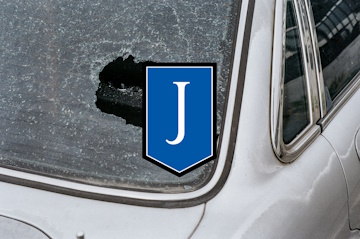Can I Sue For Rock Chip Damage?
Imagine this: you're cruising down the highway, enjoying the scenery, when suddenly—BAM! A rock flies up from the car ahead of you, leaving a nasty chip in your windshield. Frustration sets in as you realize you'll have to deal with the inconvenience and expense of repairing or replacing your windshield. But what if you suspect the other driver was somehow responsible for the rock chip? Can you hold them accountable?

Are Other Drivers Responsible for Damaging My Windshield?
Yes, you may be able to hold other drivers accountable for damage to your vehicle under certain circumstances. However, in the most common scenario—a car's wheels kicking up road debris—you typically cannot hold another driver responsible for damage to your windshield.
When Can You Hold Other Drivers Accountable?
Other drivers can be held responsible based on various state laws if they commit certain negligent actions, such as overloading vehicles or improperly securing loads. Here are some scenarios where liability might be clearer:
- Falling Debris: If the damage was caused by debris falling directly from another vehicle, such as rocks or loose cargo, the driver could be held liable.
- Reckless Driving: If the driver was driving recklessly or failed to secure their cargo properly, they could be held liable for any resulting damage.
Challenges in Proving Liability
Holding another driver responsible for rock chip damage can be difficult. Video evidence, such as footage from a dash cam, is one of the few ways you can prove that damage to your windshield was due to another driver's negligence. Additionally, based on Oregon's laws, the object that struck your vehicle needs to have directly fallen from the vehicle and subsequently hit yours. If the object hits the ground first, it is often considered road debris, and the other driver is not liable for the damage caused.
Windshield Damage On The Highway
While truck drivers have a responsibility to operate their vehicles safely, determining their liability for windshield damage can be complex. Here's what you need to know:
Specific Cause of the Damage:
- Falling Debris: If the damage was caused by debris falling from the truck, such as rocks or loose cargo, the driver could be held liable. However, if the damage was caused by a rock kicked up by another vehicle or a natural event like hail, the truck driver may not be responsible.
- Reckless Driving: If the driver was driving recklessly or failed to secure their cargo properly, they could be held liable for any resulting damage.
Evidence is Key:
Proving the truck driver's negligence can be challenging, especially without a dashcam. In Oregon, if the object hits the road first, it's often considered road debris, making it difficult to establish the truck driver's direct responsibility.
Remember:
- The burden of proof lies with you to demonstrate the truck driver's negligence.
- Without a dashcam or other strong evidence, proving liability can be difficult.
- Consulting a lawyer can increase your chances of obtaining compensation for your damages.
Steps to Take After Rock Chip Damage
- Document the Incident: Take photos of the damage and the location where it occurred. Note the time, date, and any other relevant details.
- Gather Witness Information: If there were any witnesses, get their contact information and statements.
- Report the Incident: Notify local authorities if the damage is severe, especially if it involves road conditions that need to be addressed.
- Seek Legal Advice: Consult with a personal injury lawyer to evaluate the specifics of your case.
Oregon’s Comparative Negligence Rule
Oregon follows a comparative negligence rule, which can affect your claim. If you are found to be partially at fault (for instance, if you were driving too close to a construction vehicle), your compensation might be reduced by your percentage of fault. Understanding this rule can be crucial when considering legal action.
Preventive Measures to Avoid Rock Chip Damage
While it may not always be possible to avoid rock chip damage, here are some preventive measures you can take to minimize the risk:
- Maintain a Safe Distance: Keep a safe distance from trucks and other vehicles, especially on gravel roads or near construction sites.
- Install a Windshield Protection Film: These films can add an extra layer of protection to your windshield and reduce the risk of chips and cracks.
- Stay Alert: Be vigilant while driving and watch for loose gravel, debris, and other potential hazards on the road.
Cost of Windshield Repairs and Insurance Coverage
Understanding the cost of windshield repairs and your insurance coverage can also help you navigate this issue:
- Repair Costs: The cost of repairing a rock chip can vary but typically ranges from $50 to $150. Replacing a windshield can be significantly more expensive, often costing several hundred dollars.
- Insurance Coverage: Check your auto insurance policy to see if it includes coverage for windshield damage. Some policies offer comprehensive coverage that includes repairs or replacements for windshield damage without affecting your premium.
Frequently Asked Questions (FAQs)
Q: Can I file a claim with my insurance for rock chip damage? A: Yes, if you have comprehensive coverage, your insurance may cover the cost of repairs or replacement for rock chip damage.
Q: How long do I have to file a lawsuit for rock chip damage in Oregon? A: The statute of limitations for property damage in Oregon is typically two years from the date of the incident. However, it's best to consult with an attorney to understand your specific situation.
Q: Is it worth repairing a small rock chip? A: Yes, repairing a small rock chip can prevent it from spreading and causing more significant damage, saving you from more costly repairs in the future.
So Yes You Can Sue For Rock Chip Damage, But Should You?
Rock chip damage can be an annoying and costly issue for drivers in Oregon. While holding another driver accountable for this damage can be challenging, understanding your rights and the steps to take can help you navigate the situation more effectively. Always document the incident thoroughly and seek legal advice to explore your options. Taking preventive measures can also help reduce the risk of future damage.
Disclaimer
This blog post is intended for informational purposes only and does not constitute legal advice. The specific laws and procedures surrounding holding other drivers accountable for windshield damage can vary depending on your location and the circumstances of the incident. It's essential to consult with a qualified attorney in your jurisdiction for personalized legal guidance.
The information provided in this post should not be used as a substitute for professional legal advice. If you have any questions or concerns about your specific situation, please contact an experienced personal injury attorney.

